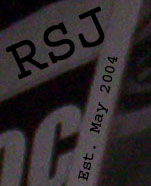|
Self-proclaimed "Electronic Junk Punk" act Babyland have managed to stay active for 16 years now, building a steady
and dedicated following in the Los Angeles and San Francisco Bay Areas of their native California. Their use of unconventional
percussion equipment and low-tech props helps them stand out from other industrial artists and makes for an unforgettable
live show experience. Over their career, they've released five full-length albums and a number of EPs and singles, recently
followed by a collection of older material titled "Decade One."
Recently, they opened for Chemlab during their performance in San Francisco, with this interview taking place shortly
before their first show back in the Bay Area since then. I met up with Dan and Smith at the Pyramid Brewery the evening before
they were slated to perform across the street at the colorful and grungy 924 Gilman Street venue in Berkeley.
Rock Star Journalism: How are you guys doing?
Dan: Pretty good.
Smith: Regular life doesn't get easier, it just gets more warped every month that goes by. And it's accelerating and it's
terrible, but I'm okay. One thing that keeps it all cool is getting to do crazy shit like this. So that's what helps.
RSJ: Babyland's been around since 1989 with a consistent line-up and constant performing. What do you think has kept your
musical partnership together for so long?
Dan: Ah...I'll get this one --
Smith: I know! I know!
Dan: I think, pretty much because it is just a partnership, and also because we're actually friends beyond the band. So,
I believe that actually being in the band enhances our friendship, and being friends enhances being in the band. And I definitely
think that there is an element of the relationship that sort of grows the longer that we're together. It's something that
over time is evolving. And it becomes stronger and more interesting, as opposed to something that we may have abandoned after
five years or so. It's an interesting experiment.
Smith: (nods to audio recorder) Yeah. That's a nod of approval.
RSJ: Most of your shows have been limited to California. Do you have any aspirations for a full US tour?
Smith: All the time. I mean, it would be great to go play places, but it's really, really difficult to try to get out
of California in terms of the time and expense involved. And the demand. You know, we do what we can, but we need a critical
mass to make it work. Times where we've tried to get out of the state of California, and we've forced someone to book some
show somewhere weird, four people showed up who really knew about what was going on. It's a whole lot of effort and work and
favors from people that maybe doesn't add up to all that much. We've had great, great shows out of state over the years, but
it's just really hard to do, and it's just not a very efficient use of our time. It may sound lame, but in some ways it would
be more efficient if someone from Kansas or somewhere came down to the Bay Area or LA and made a vacation of it. It's easier
for them to come on a plane than for us to drive out there.
Dan: We'd love to do it, but there's just no infrastructure for it. And I think it's also the equivalent of somebody saying
they'll hire you for a job, but they can only give you 16 hours a week. Ultimately, as a person who does what you do, whatever
that is, and needs to survive, you need to work more, you need to bring home more money, and you need to do more. And I think
that is sort of what it's always been. I think there may be several cities here and there that want us to come out, but, in
the end, it's about getting that support to do the all the steps. I think we realize that as we get older, we don't really
need to play just any show. We want all of the shows to be really good. We've done the sort of "punk rock, sleeping on
floors, crappy places tour." At this point, it doesn't add anything to what we want.
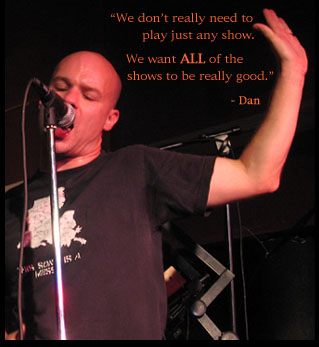 RSJ: Have you received offers to tour with other acts?
Dan: No.
Smith: (laughs) Shockingly enough, realistically, never! It's never happened. There've been things mentioned from time
to time, and it's not like no one's thought about it or tried to make it happen, but pretty much, we've never gotten any kind
of an offer to do anything serious with anyone, ever, barring, literally, [our old label] Flipside, years and years ago.
Dan: Including single shows.
Smith: Yeah. I mean, bands come to town and don't even let us know they're coming to town. Bands on our label.
Dan: Bands on our European label would come to town and not even let us know they're playing.
Smith: And you know, the first couple times we'd follow up on it, and be like, "Hey, that's cool; you're coming to
town. What's going on, tell us about the show...Need any help with anything?" And it's just, "No...No..." Hey,
it's not anyone's fault. But institutionally speaking, we're an island and no one else gives a fuck.
RSJ: How was Babyland conceived?
Smith: (laughs) Poorly.
Dan: Yeah. What was the mission statement?
Smith: It was kind of a bizarre performance art project to combine various approaches to confronting a live audience with
different media resources, and to do something that was coming from the heart and coming from an organic way of generating
art. But it was very aggressive, and it was going to confront people with some things that maybe they didn't want to look
at or hear right away.
The original concept was that it was going to include anything we could actually include; it was all about things that
we'd actually be doing -- which doesn't include playing lots of traditional musical instruments. That left percussion and
electronics and vocals, and breaking things and lighting things on fire. As well as other things that didn't necessarily survive
the original evolutionary cycle. For instance, at one point, I was convinced that the really hot thing to do within Babyland
would be to bury myself in bricks. We tried that, I think, twice. And you know, obviously, now, looking back, that was a pretty
lame idea. But it was worth the attempt, you know -- we tried that out, it didn't work, and that's not integral to the original
concept, but it's an example of some of the silly stuff we would try.
At some point it became more fun to get more musical, and really, the revolution kind of came when we realized that almost
from the first show, this was really much more than a musical thing, and it was much more than a punk rock thing and more
than a performance art thing or a visual thing. But that experimentation and trying out different things was critical to
the foundation of how we approach it and what's within it.
RSJ: You guys often use low-tech special effects, such as saws, road flares and aerosol cans during your shows. Have there
been others that didn't work out?
Smith: (laughs) Yeah! That's what I was mentioning before; the sort of experimental process had all kinds of things that
didn't work out --
Dan: Manure.
Smith: There was steer manure. We used steer manure a couple times. Fifty pound bags of bullshit spread liberally around
the audience doesn't actually make as many friends as we thought it might. We actually rented chainsaws a couple times --
which are really, really dangerous -- we didn't actually hurt anyone. That was kind of stupid. We went through a phase where
we would break lots of televisions. We probably broke 20 or 30 televisions over the first few years. Lighting different things
on fire -- there's the whole rubbing alcohol, cheesy shit that circus fire breathers would use that you could put on your
tongue. [Instead,] we went straight for motor oil, and that was really stupid. That didn't work.
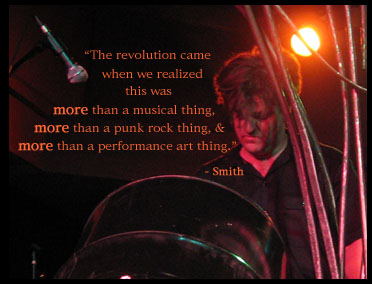 We didn't hurt anybody; we didn't kill anybody. Sometimes we would build constructs. For example, I would build a really bad
sculpture out of wood or pipe, then wrestle with it and destroy it and saw it or hack it to bits. And that was kind of fun,
but maybe I'd do it in various stages of partial nudity. I can't remember all of it -- there were some bad ideas, but they
were things that we were trying on an experimental level, and it's good we got it out of our system.
RSJ: Smith, what are the different components of your percussion kit?
Smith: The components that make up the sound-producing components of my kit are metal steel containers from the food services
industry. So, they held salad dressing or artificial garlic flavor, or some kind of strange tropical oil used to fry some
obscure meat. These containers, when emptied and sawed in half, you bang on them and they make noise. Another critical component
is one plastic drum -- I always use a plastic drum. That just gives me a deeper, kind of a kick drum sound. And I've got something
I call a crash. It's actually a heating coil for industrial applications of heating liquids; they use them in refineries and
stuff. But it's a really nice stainless steel piece that's got some looped pieces of metal to it that [yield a] fantastic
crashing sort of sound. And that was probably the single most important piece I ever found. It's getting really, really old
-- I've probably had that thing for 13 to 14 years now. I can't believe it still makes any sound at all, and I'm looking for
ways to replace it soon or find some way to retire that one cause it's about done for.
RSJ: Have there been issues using certain equipment in venues?
Dan: I think that initially there were no issues doing anything that we ever wanted to do, in terms of fire or sparks
or whatever --
Smith: Particularly in LA.
Dan: I think there were a couple times that we went on tour that people were a little taken aback by what we did in terms
of using fire and stuff. There was a period of time where we used fire a lot, and it's surprising that we didn't get beat
up or shut down more. But ultimately for us, the end, in terms of being unable to perform any remotely pyrotechnic things
in a performance, was the Great White incident. At this point we assume that the venue doesn't want us to do any sort of pyrotechnics
or sparks, and that's actually fine with us because the pyrotechnics are only involved in certain songs, and we just won't
do those songs. So, it's not like an element of the show that is separate from the songs.
Smith: Yeah, we can always live without it, but we've been vectoring away from it for awhile. We did a tour in '96 that
we used a lot of fire in every night, and by the end of that thing we were so sick; we'd given ourselves such a consistent
dose of this bad road flare and oil fire smoke nonsense that we were coughing really, really bad and getting really sick all
the time. Another thing we noticed that was really uncomfortable -- aside from some of the conflict from clubs -- was people
coming to the shows for whom maybe the [fire] was their interest; that was what they were there for, to see fire and destruction.
Was this really the kind of crowd we wanted to attract? Maybe we should focus more on the music and get away from that a little
bit.
RSJ: How did you guys end up recording a song for the film "The Doom Generation?"
Smith: (laughs)
Dan: I think somehow [director] Greg Araki became familiar with us.
Smith: He came to shows.
Dan: I think it was from shows in the early '90s that he was aware of [Babyland]. I don't know if he contacted Flipside
or us.
Smith: I think it was through Mike Hell...
Dan: It was more than likely through Mike Hell or Control Factory in LA. Anyways, he contacted us to do some music for
"Living End," the first film. He wanted to put a couple songs in that movie. At the time, both of us were totally
unemployed, so I was able to spend a little more time [on the music]. I actually spent some time with Greg Araki, hung out
with him a bit -- he was a huge fan of music. And for whatever reason he was kind of into what we did; I don't know why. He
kind of stuck with us for a while --
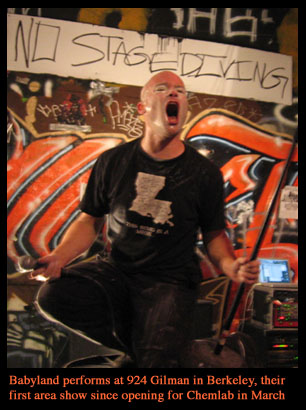 Smith: We had songs in three or four films.
Dan: We had songs in "The Living End," we had a song and performance in a movie called "Totally Fucked
Up," and then I was in "Splendor" [as the character "Mutt"]. We had a song in "Nowhere."
[Our song] "Double Coupon" was in "Doom Generation." And then in "Nowhere" --
Smith: The protagonist's bedroom!
Dan: Exactly. Basically, the lyrics on his bedroom wall are [our song,] "Dismissal."
RSJ: You guys seem to have a sort of Abbot and Costello rapport onstage, with Smith playing the more comedic role. Do
you guys have roles you consciously play onstage?
Smith: It's less Abbot and Costello and it's more Peter Cooke/Dudley Moore -- let's get it right, okay? I'm a huge Abbot
and Costello fan, and I'm blown away that's the reference you chose to use and not some horrible, more recent incarnation
of the buddy film or whatever. But yeah, that's one power of the duo, is that you got that weird tension.
Dan: It's kind of a Matt Damon --
Smith: Yeah, see, it would be horrifying if that were the reference you chose to use. Thank you. There is that rapport,
and there is always going to be a differentiation, and that's another part of it. The whole of bizarre things we were trying
to do early on -- the sort of comedy shtick part of it -- does survive. Because it is kind of real, it is kind of cool, it
lightens it up, and it's who we are. We're like that all the time.
Dan: And the other thing is that it's absolutely such a bizarre, silly thing -- the act of performance is so funny. It's
like this bizarre thing that we're allowed up on a stage to react to the music the same way everyone else is reacting, but
our reaction is mic'd. It's ridiculous, it's fun. Even to us.
RSJ: What was the motivation behind forming Mattress Records?
Smith: Nobody else was going to put it out.
Dan: Survival.
Smith: Yeah. Mattress Records came about after we'd done the first three albums with Flipside, and the whole Flipside
thing kind of came to an end. [Flipside] was totally awesome; we had a great time working with them. We learned a lot; it
totally helped us out. But when that ran its course, it was time for us to do something else. And it was obvious nobody else
on the planet was interested in really helping us do what we wanted to do. People are into it, but nobody's going to stick
their neck out, and if you want it done right you're going to do it yourself. That was the thing about Mattress. What pushed
it over the edge was that we had stuff we needed to release, but we also had friends and people we knew who were doing amazing
music who also needed that done.
In general, you'd think, wouldn't it be great or make sense if Babyland would go to this label or that label? I mean,
for the most part, those labels are fighting for their lives. The idea is to build a perception that [the label is] this great
big thing. The reality is that their great new band is selling 350 copies of their CD, and they're losing their shirts. And
the band refuses to tour, and they're going to break up, and it really doesn't matter. So, people are scared to death to
put money behind something because they're afraid of what the individuals are going to do. And Mattress, at least, is going
to be a fort, a compound. It's going to be a safe zone where people are going to be able to do their thing. We're going to
put our records out, we'll help other people out, and there's nothing anybody can do to pull the carpet out from underneath
us. And that's sort of how we continue.
RSJ: What are some challenges you've faced running the label?
Smith: (laughs) Time. Money.
Dan: Distribution.
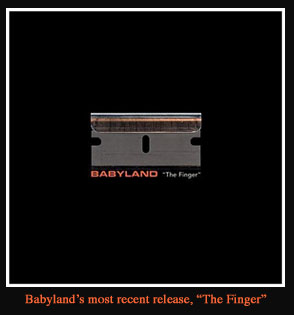 Smith: Distribution. Digital distribution. Depression.
Dan: Distribution.
Smith: Mental illness. Money. Time. People are wankers.
Dan: I have no desire to run a label or be part of a label; it's out of pure necessity. It sucks really badly; it's meant
for someone who's totally into that. We're not good at it -- we're terrible. And you know what? In the next six to eighteen
months, we're going to see a huge change in terms of how all this stuff runs [in the music industry]. It's very interesting.
Who wants to pay $15 for a CD when you can download individual songs?
Smith: The label thing is really, really weird. It's something we do to be able to put a record out. It's not something
we do because we want to be a label.
Dan: Do you like paying taxes? Do you like filling out tax forms? It's the same thing. It's the price of admission. We're
a band. Necessity. If we didn't put records out and didn't have our label, then no one would put our records out. People don't
want to put our records out. If they did, they would.
RSJ: What inspired your album, "The Finger," and its different sound?
Smith: It's really not a big concept. It's the material that we've produced over the last few years that organically encapsulates
kind of a worldview and a philosophy we held over that period of time. And also a technique, a production process and way
of doing things we held over that time. Some of the songs were things we played live a hell of a lot and really, really worked
out well. Other things were a little more experimental, and that's fine, too. But ultimately, a record is a time capsule of
how you were and how you felt and how you did things at a specific place in time. And that's actually what "The Finger"
is about. You know, if it's a little more accessible, but it has these angry edges or something, then maybe that says something
about who we were in this place in time. It's..."The Finger."
Dan: It is. And it's a yearbook. It captures. Every record is about capturing from the time it's started to the time it's
released. And then as soon as it's released, you move on. That's what it's about. That's why you can come up with endless
amounts of records. Hopefully. If you've figured out how to translate how you feel into music, it's always going to report
how you feel during a period of time. And ideally, you'd be able to continue on doing that, as opposed to ending.
RSJ: "Decade One" collects some of your earlier music and non-album tracks, but it was only released on a German
label. Are there any plans for a similar release in the US?
Dan: Of course, what do you think we are, stupid?
Smith: Yes.
Dan: At some point. It's gonna happen. And there may even be a bonus disc with something very interesting on it. But we'll
talk about that later. Hopefully, it'll happen.
RSJ: When can we expect a new album?
Dan: New album, ideally, in the fall of 2006.
Smith: Fall of 2006, and the fall maybe meaning late October, and it may mean late September. It may mean March of 2006.
Dan: Even though it's April -- we may go back in time.
RSJ: Can we expect any collaborations or compilations from you and your label mates?
Dan: We're working on a split 7'' with This Song is a Mess But So Am I; that's going to come out on a different label,
hopefully in June.
RSJ: Any plans for a Babyland DVD?
Dan: Hmm...that might be part of the "Decade One" package. We never know. There'll be so many DVDs, that at
some point, you'll be like (in a tired tone), "Oh my god, there'll be another DVD." Yeah, it's going to be DVD overload
within 12 months.
RSJ: Anything else you'd like to add?
Dan: At this point, we're going to conclude this interview with Smith and his parting words.
Smith: (laughs) Shit...Okay, uh...It was a bite thus gestured as fit for a wolf to foul; yet this dog's teeth gained not
such purchase.
Got something to say about this feature? E-mail us.
|
